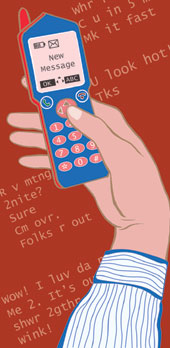 |
R we mtng 2day?
We r.
Yr place or mine?
Yrs.
10 pm? There won’t be anyone around then.
Gr8.
Next time you decide to send such a giveaway SMS, watch it — someone could be recording it. Ask David Beckham who recently faced flak, thanks to his former PA Rebecca Loos who claimed that she and Beckham had a good thing going and held out sexually explicit mobile text messages exchanged between them as proof.
Closer home, award-winning director Madhur Bhandarkar suffered from Page 3-like disillusionment in July when aspiring model-actor Preeti Jain filed an FIR claiming that she had been raped by Bhandarkar and that she had plenty of SMSs to prove their long ‘association’.
Welcome to the darker side of the SMS world where the so-called victims are now using it as a potent threat against the alleged accused. Irrespective of the speculation over Beckham’s or Bhandarkar’s guilt, these recent cases have raised an important question: can SMSs be used as evidence in a court of law?
The Information Technology Act (IT Act), 2000 recognises the sanctity of ‘electronic record’. This phrase as defined in Section 2 (t) of the Act defines electronic record “as data, record, data generated, image of sound stored, received or sent in an electronic form or micro film or computer generated micro fiche”. According to this definition, an SMS sent through mobile phone can fall under the definition ‘electronic mail’. This Act also seeks to amend schedules I to IV — the Indian Penal Code, the Indian Evidence Act, the Bankers’ Book Evidence Act and the RBI Act. The amendments generally recognise electronic record and the electronic mode of service along with conventional document and conventional mode of service.
Section 88 (A) of the amended Indian Evidence Act (which is the second schedule of the IT Act 2000) reads: “Presumption as to electronic messages: The court may presume that an electronic message forwarded by the originator through an electronic mail server to the addressee to whom the message purports to be addressed corresponds with the message as fed into his computer for transmission; but the court shall not make any presumption as to the person by whom such message was sent.” Criminal lawyer Joymalya Bagchi explains this in simple terms. “An SMS is like an unsigned letter which has been sent to your address from another address,” he says. “Say X has received an unsigned letter with only Y’s name on it. When X confronts Y, Y says he has not sent it. A SMS is just like that letter which has been sent from Y’s address but has not been sent by Y. The identity of electronic data is squarely dependent on the electronic signature and no SMS contains an electronic signature, therefore it cannot be said to be an SMS sent by a particular person. Someone can always masquerade and send it. A text message alone is not proof of its contents.”
It is indeed difficult to prove the authenticity of an SMS. As Bagchi says, “On its own an SMS cannot serve as primary evidence. However, if the police or the so-called victim’s lawyers rake up a proof of document (a signed letter or a picture, for instance) where the alleged accused () has accepted as having sent the SMS — basically any proof which corroborates or supports that had indeed sent the SMS then only can an SMS evidence be treated as corroborative evidence in a court of law.”
But doesn’t that amount to a loophole in the law? What is the point of recognising ‘electronic record’ if it cannot be used as evidence? “Yes, there exists a fallacy and it needs to be corrected,” asserts Jayjit Ganguly, a Calcutta High Court lawyer. “An SMS can help in investigation but on its own it has no value and it can only be used as a secondary or circumstantial evidence. The law needs to be amended once more if electronic records such as SMSs/e-mails are ever to be used as evidence.”
According to lawyers what is significant in the Bhandarkar-Jain or Beckham-Loos case is that in both cases the question of intention was important — in both cases the alleged accused and the complainant had been sending sexually explicit messages to each other for a long time and these messages had been saved — for what? For the sake of preserving golden moments or for entrapping the other? This in itself lends a speculative character to the complaint lodged. Moreover, lawyers assert that though no one is discounting exploitation by Beckham or Bhandarkar, the reverse could be equally true and problematic. But till such time SMSs and e-mails have the power to stand on their own in court of law as proof of evidence, nothing much can be done. But is that logical?
Dcult to tell. W & W.
Huh?
Wait and Watch.
Rt.











